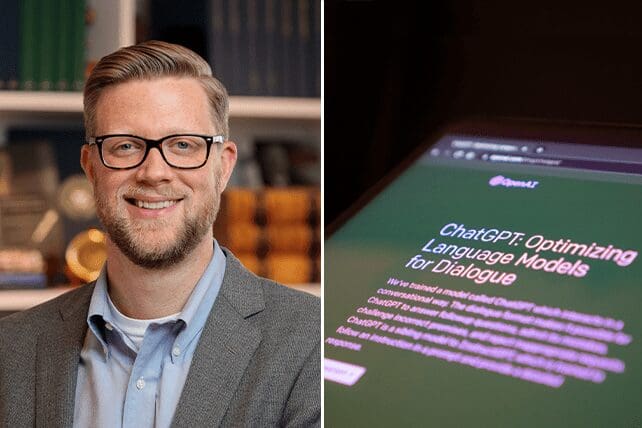Those with high levels of training and experience will pick up on these issues, but others might falsely assume that these systems are always or mostly correct. Overall, we must understand the limitations of these systems and not overly rely upon them even as we seek to harness technology to love God and love our neighbors.
What are the guardrails for ethical use of an AI chatbot like ChatGPT? For example, is it ethical for students to help formulate their thoughts for a paper? What about a pastor using it for a sermon?
One of the temptations when faced with complex or challenging ethical questions with technology is to rush to a position of full adoption or rejection of these tools. Wisdom, which is at the core of the Christian moral tradition, calls us to slow down and to think deeply about the nature of these tools, as well as the myriad of uses.
Without a doubt, any attempt to pass someone’s (or something’s in the case of AI) work off as your own is deeply problematic and unethical. This isn’t simply about needing to cite a source or two, but intentionally seeking to deceive others.
While we should reject any unethical use like this without equivocation, there may be legitimate uses of these tools, and professors would do well to think through how and if they should be employed as pedagogical practices evolve and are updated. Maybe they could be used in supervised research or even to test one’s ability to discern nuance. They may be able to summarize difficult concepts even for entry level learners, but must not be relied upon without discernment nor passed off as one’s own work.
Professors will need to alter their assignments and exams in a way that tests for actual comprehension and application rather than rote memory. Banning their use without qualification will be difficult to apply and even police given how ubiquitous its use may become. We must focus on the core motivations and rationale for one’s use as we seek the whole-person transformation in both belief and action.
Similar to the classroom, these tools may have limited use in local church ministry, but any use must be thought through with the utmost care and wisdom. They may be used to aid one in research, writing reflection questions or even basic copy for church functions. But regardless of how they may be used, one must keep in mind their limitations as well as be on guard for the temptation to simply pass off the output as their own work.
Pastors and ministry leaders must remember that preaching and teaching is not simply about information transfer, but whole-person embodied transformation. AI can do many things, but it cannot replace the hard work of ministry and caring for those whom God has entrusted to us.
In what ways is ChatGPT similar or dissimilar from other AI technologies that have come before it? Does it raise new ethical questions, or simply bring existing questions to the forefront?
In many ways, ChatGPT and other systems have popularized what has long been possible in this field even as they continue to amaze us with what they are able to do. We each utilize AI technologies each day whether we realize it or not.
Often, conversations about AI seem distant and at arm’s length, but advancements like this are pushing us to consider the real world ethical questions and ramifications of their use in our daily lives. There really isn’t anything new under the sun, as Solomon notes, even as we face what seem to be novel ethical questions in our digital age.
RELATED: Online Communion? Theology and the Digital Church
While we have always had various forms of technology, today’s advancements can seem daunting given how complex and powerful they are becoming. They are performing tasks once solely reserved for humans, and that poses a whole different set of ethical questions to consider. But at its core, technology is not really causing us to ask new questions per se, but to ask age-old fundamental questions like what it means to be human in light of some new opportunities.

